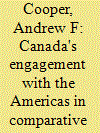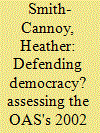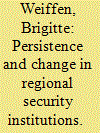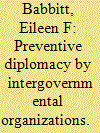| Srl | Item |
| 1 |
ID:
121220


|
|
|
|
|
| Publication |
2012.
|
| Summary/Abstract |
Recent Canadian prime ministers have embraced the hemisphere of the
Americas, albeit in a differentiated and uneven fashion. Brian Mulroney
is commonly credited with "discovering" the Americas largely through
the decision to ?nally join the Organization of American States (OAS)
in 1989.1
Jean Chrétien pushed the "more amigos the better" approach
through support for the Free Trade Area of the Americas, the summit of
the Americas process, and the targeting of Team Canada activities in the region.2
|
|
|
|
|
|
|
|
|
|
|
|
|
|
|
|
| 2 |
ID:
114743


|
|
|
|
|
| Publication |
2012.
|
| Summary/Abstract |
Inter-governmental organizations (IGOs) have vastly different capacities for intervening in conflicts in their member states. The Organization of American States (OAS), a regional IGO in Latin America, has the capacity to intervene diplomatically to defend democracy in the hemisphere. This article examines how well the OAS applied these diplomatic tools in defense of democracy in Haiti following the 2000 political crisis. I argue that the OAS achieved some success in Haiti, particularly the Electoral Technical Program. However, the bulk of the evidence suggests that the OAS missed key opportunities to invoke their strongest diplomatic tools in defense of democracy in Haiti.
|
|
|
|
|
|
|
|
|
|
|
|
|
|
|
|
| 3 |
ID:
114826


|
|
|
|
|
| Publication |
2012.
|
| Summary/Abstract |
This article follows the recent trend of bringing the Organization of American States (OAS) back into the debate on regional security, previously dominated by the accomplishments of European institutions and the shortcomings of their Asian and African counterparts. The study of the OAS is advanced here through application of an analytical framework derived from institutionalist theory. A security organization may change its form during its lifetime and pursue different kinds of tasks. The oldest regional security institution, the OAS was designed for collective security. This yielded to collective defence during the Cold War, and to cooperative security in the 1990s. After 11 September it returned to collective defence, but the contradictory reassertion of United States leadership and the emergence of South American regional power made hemispheric cooperation more difficult again. The OAS's main achievement is the extension of essential principles - democracy, human rights, and peaceful conflict resolution - to the entire hemisphere. As a diversified institution addressing a wide variety of security challenges, however, the OAS must find a coherent project alongside more focused sub-regional organizations such as the Union of South American Nations (UNASUR).
|
|
|
|
|
|
|
|
|
|
|
|
|
|
|
|
| 4 |
ID:
116424


|
|
|
|
|
| Publication |
2012.
|
| Summary/Abstract |
Abstract Conflict prevention is enjoying a renaissance in international policy circles. However, the official machinery of the international community presently offers few institutions with a specific mandate to address the causes of political violence at an early stage. One such multilateral mechanism dedicated solely to the prevention of conflict is the High Commissioner on National Minorities (HCNM) of the Organization for Security and Co-operation in Europe (OSCE). Over two decades, the office has developed a significant track record of effectiveness against which to examine the preventive efforts of other intergovernmental organizations. In this article, we examine the prevention efforts of the HCNM in Georgia, Macedonia, and Ukraine and compare these with the preventive diplomacy of three other intergovernmental organizations (IGOs): the Organization of American States (OAS) in Guyana, the Commonwealth in Fiji, and the UN in Afghanistan, Burundi, and Macedonia. Our findings offer some useful and surprising insights into effective prevention practice, with implications for how IGOs might improve preventive diplomacy in the future.
|
|
|
|
|
|
|
|
|
|
|
|
|
|
|
|